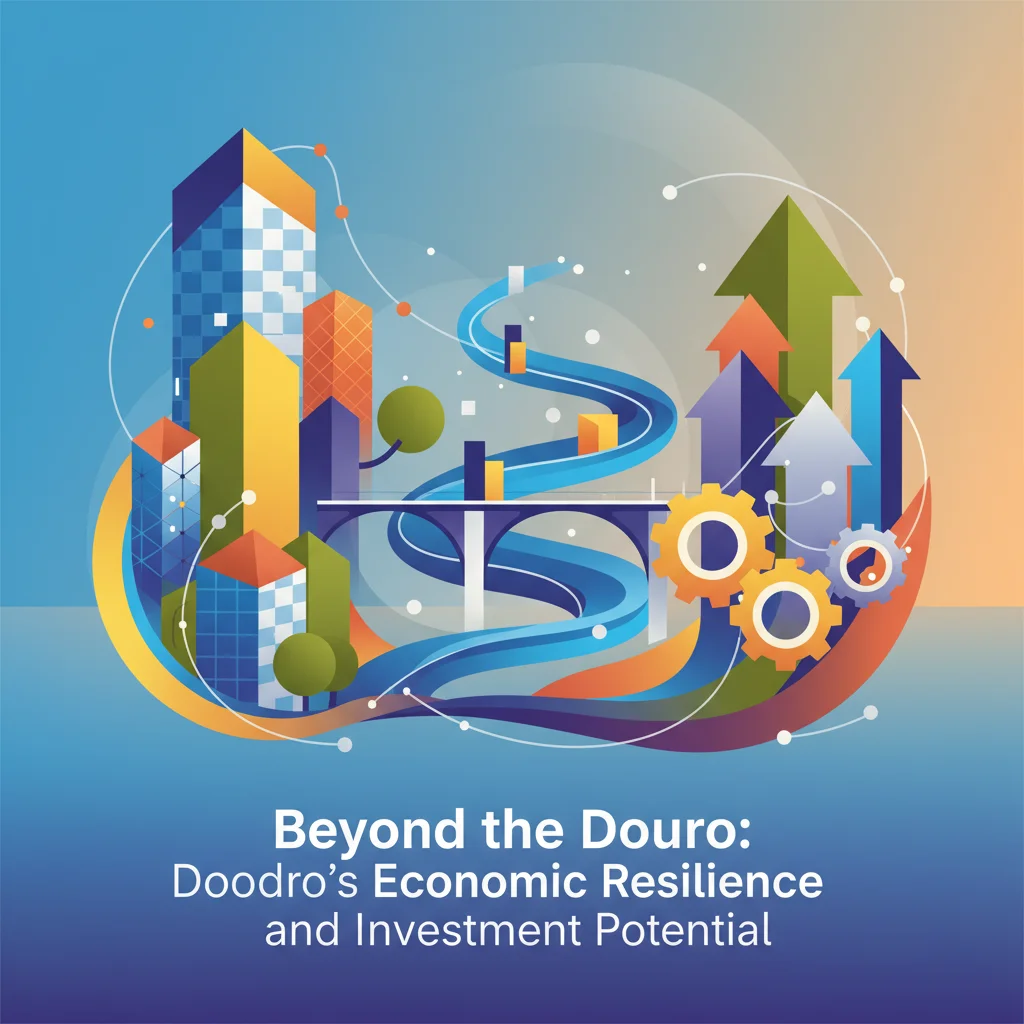
Beyond the Douro: Decoding Porto’s Economic Resilience and Investment Potential
There’s a certain “rough magic” to Porto, a quality the Financial Times aptly describes as a “frank and easy charm.” Strolling through its steep, cobbled streets, past tiled facades and bustling riverside cafes, one feels a city comfortable in its own skin—a place with a rich history that doesn’t need to shout about its growing significance. For the casual visitor, this is a captivating travel experience. But for the discerning investor, finance professional, or business leader, this atmospheric charm is a surface-level indicator of something far more profound: a deep-seated economic resilience and an undervalued investment thesis waiting to be explored.
In a world of hyped-up growth narratives and volatile market sentiment, Porto represents a different kind of opportunity. It’s an object lesson in the power of fundamentals, the importance of cultural heritage in modern economics, and the potential that lies in markets that are growing organically rather than artificially. To understand the investment case for Porto, we must look beyond the tourist trail and decode the economic DNA that gives this city its unique and durable strength.
The Historical Bedrock of a Modern Economy
Porto’s story is inextricably linked to commerce, trade, and finance. Long before the advent of modern stock market tickers and complex trading algorithms, this city was a global hub. Its very name, “O Porto” (The Port), speaks to its foundational purpose. For centuries, it was the heart of Portugal’s trade with the world, its docks bustling with ships carrying port wine, textiles, and other goods. This history isn’t just a quaint backdrop; it has forged a city with an ingrained understanding of global supply chains, risk management, and long-term value creation.
This mercantile legacy has several modern-day implications for today’s economy:
- Inherent Resilience: A city built on trade learns to weather economic storms. Porto has navigated centuries of shifting political alliances, global economic downturns, and changing consumer tastes. This history has cultivated a pragmatic and adaptable business culture, one that doesn’t chase fleeting trends but focuses on sustainable, profitable enterprise.
- Global Mindset: Porto has always looked outwards. This international perspective is a significant asset in today’s interconnected world, making it a natural home for export-oriented businesses and a welcoming environment for foreign direct investment.
- Generational Knowledge: Industries like the port wine trade are built on knowledge passed down through generations. This represents a form of intangible asset—a deep understanding of product, market, and process that is difficult to replicate. This principle of long-term stewardship is a valuable lesson in an era of short-term corporate thinking.
Understanding this historical context is crucial. It shows that Porto’s current economic upswing is not a sudden, flash-in-the-pan phenomenon. It is the modern chapter of a long story of commerce and innovation, built on a foundation of solid economic principles.
From “Rough Magic” to Tangible Assets: Porto’s Burgeoning Tech and Fintech Scene
The city’s “frank and easy charm” is more than just an aesthetic quality; it’s a competitive advantage. This authentic, high-quality-of-life environment is proving to be a powerful magnet for talent, particularly in the technology and financial technology sectors. While Lisbon often grabs the headlines, Porto has quietly been building a formidable tech ecosystem, turning its historic merchant-class work ethic towards the digital frontier.
Several factors are fueling Porto’s rise as a tech hub:
- Talent Pipeline: The University of Porto is one of the top-ranked institutions in Europe, consistently producing high-caliber engineering and tech talent.
- Cost Competitiveness: Compared to established hubs like London, Berlin, or Dublin, Porto offers a significantly lower cost of living and more affordable commercial real estate, allowing startups and established companies to extend their runways and invest more capital into growth.
- Ecosystem Support: A growing network of incubators, accelerators, and venture capital firms is providing the necessary infrastructure for innovation. Major tech companies have also established significant operations in the region, creating a virtuous cycle of talent and investment.
This growth is particularly pronounced in the fintech sector. As the traditional banking industry faces disruption, Porto is becoming a key location for developing the next generation of financial technology. From payment processing startups to companies exploring blockchain applications for supply chain finance, the city is leveraging its historical connection to commerce to innovate in the digital age. This fusion of old-world trading knowledge with new-world technology creates a unique and powerful synergy.
To put Porto’s competitive position into perspective, consider how it stacks up against other European tech cities.
| Metric | Porto, Portugal | Krakow, Poland | Tallinn, Estonia |
|---|---|---|---|
| Avg. Software Engineer Salary (Annual) | €35,000 – €50,000 | €40,000 – €55,000 | €45,000 – €60,000 |
| Grade A Office Rent (€/sqm/year) | ~€220 | ~€250 | ~€280 |
| Startup Output (Per 1M Pop.) | High | Very High | Exceptional |
| Quality of Life Index | Very High | High | High |
Note: Figures are estimates for illustrative purposes.
As the table shows, Porto presents a compelling value proposition: a highly skilled talent pool and excellent quality of life at a competitive cost base. For companies in the finance and tech sectors, this is a powerful formula for sustainable growth.
The Macro-Economic Context: Portugal’s Turnaround Story
A city’s success does not happen in a vacuum. Porto’s ascent is anchored in Portugal’s remarkable national economic recovery. A decade ago, Portugal was one of the Eurozone economies hit hardest by the sovereign debt crisis. Today, it is frequently cited as a model of successful reform and fiscal discipline.
The national government has implemented policies that have bolstered the country’s finances, attracted foreign investment, and fostered a pro-business environment. Key achievements include:
- Fiscal Consolidation: Portugal has made significant strides in reducing its budget deficit and managing its public debt, earning credibility with international markets and credit rating agencies.
- Structural Reforms: Labor market and regulatory reforms have increased the economy’s competitiveness and flexibility.
- Tourism and Export Boom: The country has successfully diversified its economy, with tourism and high-value exports becoming major drivers of GDP growth. This has had a direct positive impact on the national stock market, with the Euronext Lisbon index showing increased stability and attracting renewed investor interest.
This stable macroeconomic backdrop provides a crucial tailwind for cities like Porto. It creates a predictable environment for investing, reduces sovereign risk, and ensures that local growth is supported by national economic strength. The country’s commitment to integrating new technologies, from renewable energy to financial technology, further signals a forward-looking approach to economic management. The success of the national economy and the dynamism of cities like Porto are mutually reinforcing, creating a powerful narrative for anyone looking to invest in a stable, growing European market.
As one local artisan in the FT piece noted about their craft, it’s about finding the “right balance.” (source) The same can be said for Portugal’s economy—a balance between fiscal prudence and pro-growth policies, between honoring tradition and embracing innovation.
Conclusion: The Enduring Value of Authenticity
The “rough magic” of Porto is, in essence, the magic of authenticity. It is a city that has not sold its soul for growth but has instead leveraged its unique identity to build a modern, resilient, and dynamic economy. For the world of finance and investing, which is so often obsessed with dissecting quarterly reports and algorithmic trading patterns, Porto offers a potent reminder: the most enduring value is often found in the fundamentals of culture, community, and history.
By understanding the city’s deep-rooted commercial past, its burgeoning tech and fintech scene, and the supportive macroeconomic environment, we can see Porto for what it truly is: not just a charming destination, but a sophisticated and compelling investment thesis. It teaches us that the most promising opportunities are often not the loudest or the shiniest, but those with a quiet confidence, a strong foundation, and a story that makes sense on and off the balance sheet.


